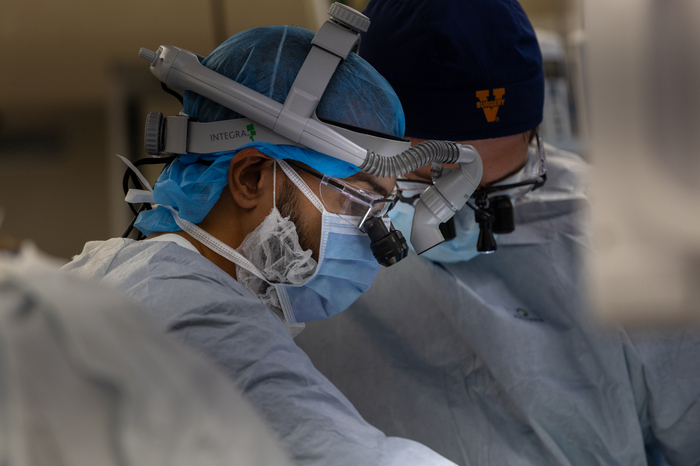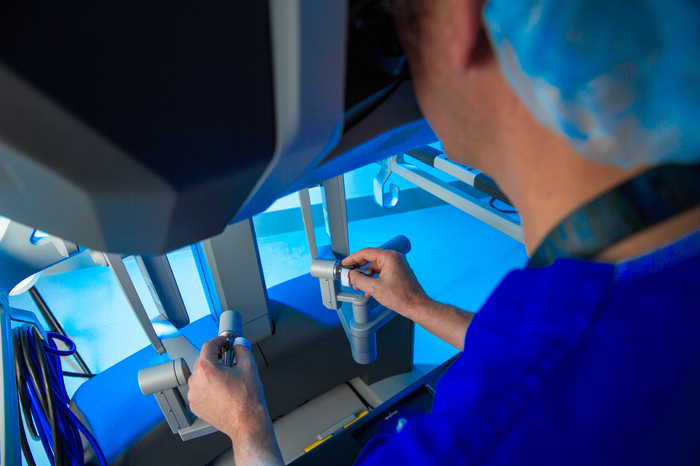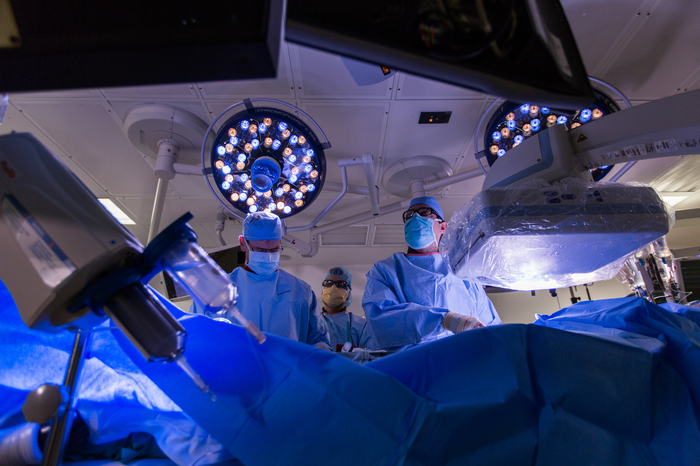Thoracic Surgery
Thoracic Surgery
Thoracic Surgery
You may not know what your thorax is until you need a thoracic surgeon. Thoracic surgeons perform surgeries related to the lungs, esophagus or chest wall, as well as lung cancer surgery.
At Carilion Clinic, cardiothoracic surgeons run our thoracic surgery program. That means they're experts in both heart surgery and thoracic, or chest, surgery.
We have the largest team of cardiothoracic surgeons in the area. Our surgical and cancer teams also work closely together to make sure you get the treatment you need when you need it.
You may not know what your thorax is until you need a thoracic surgeon. Thoracic surgeons perform surgeries related to the lungs, esophagus or chest wall, as well as lung cancer surgery.
At Carilion Clinic, cardiothoracic surgeons run our thoracic surgery program. That means they're experts in both heart surgery and thoracic, or chest, surgery.
We have the largest team of cardiothoracic surgeons in the area. Our surgical and cancer teams also work closely together to make sure you get the treatment you need when you need it.
Thoracic surgery can mean any surgery that happens in your chest. Heart surgery is a type of thoracic surgery.
But thoracic surgery also treats the organs and structures that help you breathe and swallow.
These include your:
- Lungs: Move oxygen in and carbon dioxide out of the blood
- Chest wall: Protects the lungs
- Esophagus: Tube that runs from your throat to your stomach
- Windpipe (trachea): Connects the mouth to the lungs
- Diaphragm: Muscles that help you breathe
- Mediastinum: The space between your lungs
Thoracic surgeons do a variety of procedures. One of the many ways they work within the thoracic cavity includes using video cameras called scopes. These can diagnose or treat health issues. The addition of tools to the scope means they can also sample and remove tumors and do minimally invasive surgeries.
What Is Thoracic Surgery?
Thoracic surgery can mean any surgery that happens in your chest. Heart surgery is a type of thoracic surgery.
But thoracic surgery also treats the organs and structures that help you breathe and swallow.
These include your:
- Lungs: Move oxygen in and carbon dioxide out of the blood
- Chest wall: Protects the lungs
- Esophagus: Tube that runs from your throat to your stomach
- Windpipe (trachea): Connects the mouth to the lungs
- Diaphragm: Muscles that help you breathe
- Mediastinum: The space between your lungs
Thoracic surgeons do a variety of procedures. One of the many ways they work within the thoracic cavity includes using video cameras called scopes. These can diagnose or treat health issues. The addition of tools to the scope means they can also sample and remove tumors and do minimally invasive surgeries.
Thoracic surgery includes all the types of heart surgery we do for health issues like coronary artery disease and heart valve disease.
Thoracic surgery also treats:
- Lung cancer: A pneumonectomy removes your entire lung, while a lobectomy removes a lobe of your lung. A wedge resection just removes part of it. We can do a VATS lobectomy, which is a minimally invasive surgery.
- Lung problems: We treat collapsed lungs (pneumothorax) and fluid in the lungs (pleural effusion). We may do a thoracoscopy to examine the space around your lungs. This is a minimally invasive procedure that helps us see inside the chest.
- Esophageal cancer: With an esophagectomy, we remove all or part of the esophagus. Then, we reconstruct it using other tissue from your body.
- Chest tumors: You can develop both cancerous and noncancerous tumors in your chest wall. We can remove the tumor and reconstruct your chest wall.
- Tracheal disorders: We treat a range of windpipe problems. This includes removing tumors and treating the narrowing of the trachea (which makes it hard to breathe).
- Mesothelioma: This is a type of tissue cancer that often affects the lungs. Asbestos exposure is the primary risk factor. We can do surgery to remove tissue in and around the lungs.
- Mediastinal masses: This includes tumors, cysts and enlarged lymph nodes in the space between your lungs. We do a scope procedure called a mediastinoscopy to examine the area, often removing lymph nodes.
What Conditions Can Thoracic Surgery Treat?
Thoracic surgery includes all the types of heart surgery we do for health issues like coronary artery disease and heart valve disease.
Thoracic surgery also treats:
- Lung cancer: A pneumonectomy removes your entire lung, while a lobectomy removes a lobe of your lung. A wedge resection just removes part of it. We can do a VATS lobectomy, which is a minimally invasive surgery.
- Lung problems: We treat collapsed lungs (pneumothorax) and fluid in the lungs (pleural effusion). We may do a thoracoscopy to examine the space around your lungs. This is a minimally invasive procedure that helps us see inside the chest.
- Esophageal cancer: With an esophagectomy, we remove all or part of the esophagus. Then, we reconstruct it using other tissue from your body.
- Chest tumors: You can develop both cancerous and noncancerous tumors in your chest wall. We can remove the tumor and reconstruct your chest wall.
- Tracheal disorders: We treat a range of windpipe problems. This includes removing tumors and treating the narrowing of the trachea (which makes it hard to breathe).
- Mesothelioma: This is a type of tissue cancer that often affects the lungs. Asbestos exposure is the primary risk factor. We can do surgery to remove tissue in and around the lungs.
- Mediastinal masses: This includes tumors, cysts and enlarged lymph nodes in the space between your lungs. We do a scope procedure called a mediastinoscopy to examine the area, often removing lymph nodes.
As with any surgery, you and your doctor will discuss the risks and benefits of the different surgical approaches. Your surgical options typically depend on the specific health issues we're treating.
If you're having thoracic surgery to treat cancer, you may also need chemotherapy and radiation. We work closely with lung cancer specialists to create the right treatment plan.
We can do interventional heart procedures instead of surgery for many heart issues, including replacing heart valves. These procedures use catheters threaded through your blood vessels to the heart instead of incisions.
You'll also discuss whether your thoracic surgery will be open or use a less invasive approach. We can treat many thoracic health issues, including lung cancer, with minimally invasive surgery.
Minimally invasive thoracic surgery uses only small incisions (instead of one big incision in your chest). This is VATS, or video-assisted thoracoscopic surgery. We pass a small instrument with a camera and surgical tools through the incisions. The surgeon uses the small tools to do the operation, which they watch on the camera.
We also have a robotic thoracic surgery program that uses robotic-assisted technologies, including the da Vinci Surgical System. They perform surgeries, including lung cancer surgery. Robotic approaches provide more precision and quicker recovery times.
What Type of Thoracic Surgery Is Right for Me?
As with any surgery, you and your doctor will discuss the risks and benefits of the different surgical approaches. Your surgical options typically depend on the specific health issues we're treating.
If you're having thoracic surgery to treat cancer, you may also need chemotherapy and radiation. We work closely with lung cancer specialists to create the right treatment plan.
We can do interventional heart procedures instead of surgery for many heart issues, including replacing heart valves. These procedures use catheters threaded through your blood vessels to the heart instead of incisions.
You'll also discuss whether your thoracic surgery will be open or use a less invasive approach. We can treat many thoracic health issues, including lung cancer, with minimally invasive surgery.
Minimally invasive thoracic surgery uses only small incisions (instead of one big incision in your chest). This is VATS, or video-assisted thoracoscopic surgery. We pass a small instrument with a camera and surgical tools through the incisions. The surgeon uses the small tools to do the operation, which they watch on the camera.
We also have a robotic thoracic surgery program that uses robotic-assisted technologies, including the da Vinci Surgical System. They perform surgeries, including lung cancer surgery. Robotic approaches provide more precision and quicker recovery times.
Thoracic surgery covers a wide range of procedures. Your surgeon and care team will give you specific information about your surgery. These are some general things to keep in mind.
Before thoracic surgery
Before any thoracic surgery, you'll need certain imaging tests like a CT or PET scan. For surgeries related to your heart, this can include tests like echocardiograms. Your care team will review what other heart and blood vessel tests you might need.
Your doctor will want to test how well your lungs work for surgeries related to your lungs. They may also do a biopsy first to assess any tumors you have.
During thoracic surgery
During your surgery, you'll receive anesthesia. Many thoracic surgeries involve a breathing tube or scope, so it's better to be asleep.
For certain heart surgeries, you may be on a heart-lung bypass machine. This machine does the work of your heart and lungs so the surgeon can safely operate on them.
After surgery, you'll go to a post-anesthesia or intensive care unit. Once your doctor removes your breathing tube, they may have you do breathing exercises to help your lungs expand.
Recovering from thoracic surgery
Recovery depends on the type of surgery you had. Open surgeries, including open-heart surgery, have a longer recovery than minimally invasive ones. It can take 6 to 12 weeks to recover from an open surgery.
With VATS and robotic surgery, you'll likely stay in the hospital a few days. People typically return to work and other activities within about 2 weeks.
For certain types of thoracic surgery, we'll prescribe cardiac rehabilitation. Cardiac rehab's supervised exercises help your heart and lungs get stronger.
What Should I Expect?
Thoracic surgery covers a wide range of procedures. Your surgeon and care team will give you specific information about your surgery. These are some general things to keep in mind.
Before thoracic surgery
Before any thoracic surgery, you'll need certain imaging tests like a CT or PET scan. For surgeries related to your heart, this can include tests like echocardiograms. Your care team will review what other heart and blood vessel tests you might need.
Your doctor will want to test how well your lungs work for surgeries related to your lungs. They may also do a biopsy first to assess any tumors you have.
During thoracic surgery
During your surgery, you'll receive anesthesia. Many thoracic surgeries involve a breathing tube or scope, so it's better to be asleep.
For certain heart surgeries, you may be on a heart-lung bypass machine. This machine does the work of your heart and lungs so the surgeon can safely operate on them.
After surgery, you'll go to a post-anesthesia or intensive care unit. Once your doctor removes your breathing tube, they may have you do breathing exercises to help your lungs expand.
Recovering from thoracic surgery
Recovery depends on the type of surgery you had. Open surgeries, including open-heart surgery, have a longer recovery than minimally invasive ones. It can take 6 to 12 weeks to recover from an open surgery.
With VATS and robotic surgery, you'll likely stay in the hospital a few days. People typically return to work and other activities within about 2 weeks.
For certain types of thoracic surgery, we'll prescribe cardiac rehabilitation. Cardiac rehab's supervised exercises help your heart and lungs get stronger.
At Carilion, we offer routine heart care in your neighborhood and are a destination for many specialty surgeries. Carilion offers programs and new heart and lung treatments unique to our region, drawing people from across the state.

40+ years of heart and thoracic surgery
The area's largest and most experienced cardiothoracic surgery program, we were the first to offer open-heart surgery. We also do more than 5,000 minimally invasive heart procedures every year.

Minimally invasive surgical techniques
We're able to offer many minimally invasive and robotic-assisted procedures that use smaller incisions. We also have surgeons trained to use robotic-assisted devices when performing lung cancer surgeries.

The region's only hybrid operating rooms
Hybrid ORs have all the latest surgical equipment, plus complete imaging capabilities. We can do both minimally invasive and open procedures under one anesthesia. It's safer and makes for a quicker recovery.

A large team of surgeons who work together
Our cardiothoracic surgeons work closely with our vascular surgeons. We consult each other about each person’s surgical needs. We also team up with interventional cardiologists and electrophysiologists, performing some procedures together.
Why Choose Carilion Clinic?
At Carilion, we offer routine heart care in your neighborhood and are a destination for many specialty surgeries. Carilion offers programs and new heart and lung treatments unique to our region, drawing people from across the state.
Get Care at Carilion Clinic
Your path to better health starts here. Explore comprehensive care options and find the support you need for every step of your wellness journey.
Get Care at Carilion Clinic
Your path to better health starts here. Explore comprehensive care options and find the support you need for every step of your wellness journey.
Get Care at Carilion Clinic
Your path to better health starts here. Explore comprehensive care options and find the support you need for every step of your wellness journey.
Get Care at Carilion Clinic
Your path to better health starts here. Explore comprehensive care options and find the support you need for every step of your wellness journey.